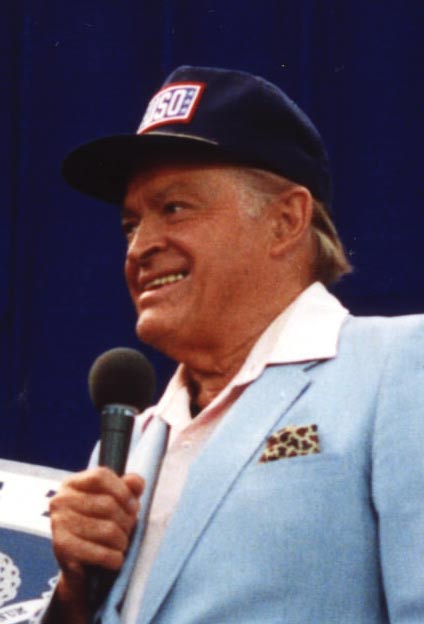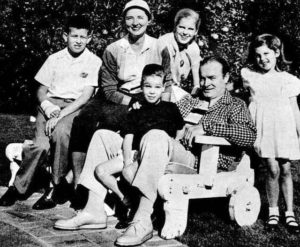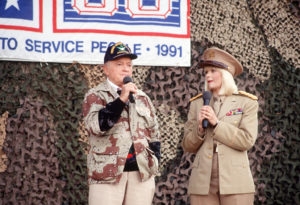
Bob Hope lived to be 100 years old, a milestone that few people reach. His life reads like a history lesson. He experienced firsthand many noteworthy events of the 20th century. For example, during his life he witnessed major advancements in transportation, from the automobile to the airplane to the space program. When he was a child, radio was still a new-fangled form of entertainment, but Hope later saw the birth of cinema, television, and the Internet. He lived through the Great Depression, five wars, and countless world tragedies. Through it all, Bob Hope was one of the most beloved and celebrated entertainers of the 20th century. He made 75 films, took part in 475 television programs, and wrote 10 books in his 100 years of living. However, he is most noted for entertaining U.S. military troops during every war from 1941 to 1990. Over and over again, he said thank you to those brave men and women who fought for freedom and democracy.
Bob Hope was born on May 29, 1903, in England. When Bob was four years old, his family came to America through Ellis Island and settled in Cleveland, Ohio. With seven boys, the Hope family didn’t have much money, but they laughed often and humor got them through the tough times. “One of my memories was [my mother’s] Saturday night routine,” Hope fondly recalled. “She’d get out a big washtub and give us baths in the kitchen.” Baths were given in order of how well behaved the Hope boys had been all week. “If we’d been good, we got freshwater,” explained Hope. It was one of his first lessons in the benefits of exhibiting good character.
Hope decided to forgo college and pursue his dream of becoming an entertainer. He knew he did not want a conventional job, but in those early days, there were many times when he couldn’t afford rent and often went hungry. In those lean times, his mother was his biggest supporter and often wrote him letters urging him to keep going. “One of the greatest things about my mother was that she never stopped encouraging us,” said Hope.
Hope entered show business in 1924 as a song and dance man, but it was his quick wit and unstoppable sense of humor that eventually made him famous. Early in his career, he traveled endlessly from one city to the next playing the local vaudeville theaters, where he entertained large and small audiences alike. Hope was one of more than 20,000 vaudeville performers in the 1920s, but he easily transitioned to radio, the next hot fad. He created and produced one of the most successful weekly radio shows of the 1930s and ’40s.
Hope went on to conquer the movie industry, as well as the newest invention entering America’s living rooms—the television. During his first televised show, Hope joked about this new medium. “For years I’ve been on radio. You remember radio—blind television?” He worked hard between 1924 and 1941 to build a lucrative career in show business. Hope went on to be a part of every major media form created in the 20th century. Very few entertainers, if any, can make that claim.
Hope worked hard to achieve the American dream, but he felt a need to give something back, too. He began his 50-year relationship with U.S. military troops in 1941 by broadcasting his hit radio show from military bases. At first, he was innocently looking for a large audience on which to test his material. Performing for 2,000 entertainment-hungry GIs was the perfect setting. Soon, however, it was about much more than just testing his material. Hope liked the idea of entertaining GIs who were fighting to preserve the American way of life he had grown to enjoy. He began a lifelong commitment to the troops when he partnered with the USO (United Services Organization) and began traveling around the world to bring a piece of home to the troops.
The mission of the USO was “to provide morale, welfare, and recreation-type services to our men and women in uniform.” No one fulfilled this mission better than Bob Hope. He would gather up the best musicians, singers, and actors to produce a show, rehearse it, and take it on the road to military bases, camps, and hospitals wherever GIs were stationed. “When I saw Bob Hope I was probably as homesick as any one person could be,” said one Air Force serviceman, “but he brought a bit of America and home to each one of us, and after that, life was much easier.” Over the years, Hope headlined approximately 60 tours including those during World War II, the Korean War, Vietnam, and the Persian Gulf War.
Hope encouraged and supported servicemen and women, often in perilous times, simply because he knew that taking their minds off their situation for an hour or two was the most valuable thing he could do. He thought of them as family. Just as humor got the Hope family through tough times when they didn’t have much, Hope’s humor would also get the troops through their own tough times.
His first tour took him to military bases in Alaska, where soldiers were located in a desolate area and in desperate need of a morale booster. “Some of these boys have been stuck out in a godforsaken outpost for more than a year—with old books, old newspapers, old movies, and stale relationships. I don’t think you have any idea what you’re doing for them,” said Army General Simon Buckner. Hope and his cast of entertainers performed several shows in the remote corners of Alaska, and that first trip changed him forever. He was touched by what the soldiers endured and was grateful for the sacrifices they were making. It was the first of many trips to come.
In 1943 Hope led a group of entertainers on the first overseas USO trip. The tour took them to bases in Africa, Sicily, and Iceland, as well as into the war zones of England. The realities of war were all around them as air raids and bombs came dangerously close. “It isn’t often that a bomb falls so close that you can hear it whistle,” wrote WWII journalist Ernie Pyle. “The Hope troupe can now describe that ghastly sound.” Hope later said that the only thing that went through his mind during those brushes with death was the thought of his wife waiting for him at home. “I’ve had a number of close calls,” recalled Hope of traveling with the USO. “When I remember them I get an uneasy feeling that I’m living on borrowed time. Especially when I recall the close calls I had flying a million miles or so for the USO in WWII.”
Hope’s commitment to the troops was so strong though that nothing could make him pack up and return home, not even bombs falling a little too close for comfort. He continued performing at camps and visiting the wounded at numerous hospitals. “There isn’t a hospital ward that he hasn’t dropped into and given a show; there isn’t a small unit anywhere that isn’t either talking about his jokes or anticipating them,” commented actor Burgess Meredith. “What a gift laughter is! Hope proves it.” Hope often said that performing for the troops provided him with the most memorable experiences of his life. “I wouldn’t trade it for my entire career,” he said. “Until you’ve actually seen them in action, you have no conception of their courage.” Hope was courageous too, and he proved it by continuing to tour time and again. In 1944 he went to the South Pacific, and in 1945 he traveled to France, Germany, and England. In Nuremberg he did a show for 20,000 GIs and stayed in a hotel with only three walls—the fourth had been destroyed by bombs. When he returned from these trips he often spent hours calling GIs’ loved ones and passing on messages from GIs he met. It was important to these servicemen and women that their loved ones knew they were okay. Hope unselfishly took the time to personally deliver each message.
 While Hope was traveling to entertain the troops, often for weeks at a time, he was also leaving his own family behind. His wife, Dolores, was a singer, and they adopted a little girl named Linda, the first of four children. Hope loved fatherhood. “Once we got her home, I was enthusiastic about the whole business,” said Hope. “Everything began to revolve around her, and she wound herself around me like a small blonde boa constrictor.” Bob and Dolores adopted a son, Tony, a year later. They wanted to continue to add to their family, but Hope was away during WWII entertaining the troops so frequently that they put more adoptions on hold for six years. When he returned in 1946, they visited the adoption agency again. To their surprise, a little girl and a little boy were both available for adoption. Bob left Dolores alone in the nursery to decide which child she wanted to take home, while he went to the office to talk with the administrator. “When Dolores came in a little later, still puzzled about what decision to make, I’d already signed for both babies,” recalled Hope.
While Hope was traveling to entertain the troops, often for weeks at a time, he was also leaving his own family behind. His wife, Dolores, was a singer, and they adopted a little girl named Linda, the first of four children. Hope loved fatherhood. “Once we got her home, I was enthusiastic about the whole business,” said Hope. “Everything began to revolve around her, and she wound herself around me like a small blonde boa constrictor.” Bob and Dolores adopted a son, Tony, a year later. They wanted to continue to add to their family, but Hope was away during WWII entertaining the troops so frequently that they put more adoptions on hold for six years. When he returned in 1946, they visited the adoption agency again. To their surprise, a little girl and a little boy were both available for adoption. Bob left Dolores alone in the nursery to decide which child she wanted to take home, while he went to the office to talk with the administrator. “When Dolores came in a little later, still puzzled about what decision to make, I’d already signed for both babies,” recalled Hope.
Hope sacrificed holiday celebrations with his own family to begin what became his annual Christmas tour to visit the troops. Beginning in 1957 his Christmas tour was turned into a popular television broadcast. These shows brought the sacrifice of the American GI to Americans at home. “The American television audience could see that Bob had gone to faraway places, had endured the same unpredictable weather and hardship conditions the GIs were subjected to, and had brought them a laugh and a touch of home,” said one biographer.
Producing these Christmas shows was expensive. They often went over budget, but Hope personally covered the extra cost because he believed so strongly in what he was doing. He made the choice to forfeit his family holidays because he knew that the U.S. soldiers were making a bigger sacrifice. Those men and women had no choice, particularly during WWII, Korea, and Vietnam, when the draft was still in place. They couldn’t put down their guns, cease fighting, and travel home for the holidays. Hope, however, had a choice. Congressman Paul Findley said, “Christmas away from home, whether in the cold reaches of Germany during WWII, or the sweltering heat of Vietnam years later, was still enjoyable and memorable to millions of American men and women because Bob Hope was there.”
During the Vietnam War, Hope faced new challenges. Vietnam was the first military conflict to be broadcast into American homes on the evening news, and there was a strong anti-war culture among America’s youth. Hope took his USO tour to Vietnam nine times between 1964 and 1972, and in a book about his 1964–65 tours of Southeast Asia, he wrote, “I might as well admit it, I have no politics where the boys are concerned. I only know they’re over there doing a job that has to be done, and whatever is best for them is best for me.”
During one of his Christmas tours in Vietnam, Hope reached Saigon to find that a nearby hotel had been bombed moments before his arrival. He and his cast of entertainers ignored the dangerous conditions and checked into another hotel nearby. Hope immediately went to the Naval Medical Corps facility to visit the injured in the burn ward. “Burn wards are the toughest of all…you wonder if your stomach will allow you to continue,” he once said. Hope came across one marine whose injuries were being examined by a doctor. “He looked up at me, his face covered with blood, and said ‘Merry Christmas’ as if he really meant it, and I don’t suppose I will ever forget the way he said it. It still chills me,” recalled Hope. He visited hospitals on all his tours before and after the shows. It was difficult not to get depressed or jaded by the horrific sites he encountered, and even more difficult to go out on stage and be funny for an hour or two after these visits. But those experiences only made Hope work harder because he knew that many soldiers would pay the ultimate price in their fight for democracy and would not make it home. Those moments of ease filled with laughter would be the last for many of them.
Each of Hope’s shows was unique. Surprise guests, including some of the most beautiful actresses of the day, often joined him on stage. The shows were a combination of comedy, musical performances, and crowd participation. Hope usually brought down the house with his jokes and impeccable timing. An entire room still holds the 85,000 jokes that he told at one time or another. He kept his material fresh and was not afraid to poke fun at the current situation. During a tour in Vietnam, he joked, “I have good news for you guys, the country is behind you 50 percent.” The servicemen in the audience smiled, laughed, clapped, and cried at some point during every show. One of the classic songs he performed near the end of the show was Thanks for the Memories. Hope wanted every GI to know how honored he was to entertain them.
After the Vietnam War ended, Hope continued to visit military hospitals. From 1973 through 1975, he made it a priority. “For most of us, the war is over. For many of these kids it will never end,” he said. Many soldiers sustained injuries during the Vietnam War that would leave them debilitated for the rest of their lives. As Hope went from bed to bed, many of the wounded soldiers would share stories of where they were stationed overseas and at what base they saw his show. He would reminisce with them as if they were old friends. He also continued to travel to bases around the world and to put on his show even in peacetime.
Remarkably, in 1990, when Hope was 87 years old, he packed his bags and gathered a group of entertainers for his last big overseas show and what would also be his last Christmas show. Hope headed to Saudi Arabia, where the Persian Gulf War and Operation Desert Storm were in full swing. Security was much more intense than it had been in the past; even Hope’s jokes were screened by the State Department. The tour was a success despite the close scrutiny, and for one final time, the world-famous comedian was able to bring the men and women of the Armed Forces some much needed entertainment during the holidays.
For all his commitment, Americans love Bob Hope. There is a warehouse in California that houses the many awards he won during his lifetime. In 1962 President John F. Kennedy presented Bob Hope with the Congressional Medal of Honor, the highest recognition offered to a civilian. The president said it represented “the great appreciation we have for you for so many years of going so many places to entertain our sons, daughters, brothers, and sisters of America who were so very far from home.” Hope, as always, responded with humor. “There is one sobering thought: I received this for going out of the country. I think they’re trying to tell me something,” he said.
In 1997, an Act of Congress made way for Hope to receive his most valued honor: he was made an honorary veteran of the U.S. Armed Forces. He cried when the resolution was read, and Dolores spoke for him when she said, “I’ve been given so many awards in my lifetime, but to be numbered among the men and women I admire most is the greatest honor I have ever received.” President Bill Clinton then signed the bill into law and Hope went on to visit the Vietnam War memorial. He stood alone for a long time as he looked over the wall that held the names of so many of the soldiers he had seen in the audiences during his nine trips to Vietnam. Each of the 58,245 names on that wall represented a life that was lost as American soldiers fought to protect freedom and democracy. Hope was so grateful for those sacrifices, none of which could ever be repaid, that he made it his lifelong duty to prove just how thankful and appreciative he was.
Bob Hope died on July 27, 2003. He was 100 years old. Several city streets, schools, and hospitals across America are named after him. There is a C-17 Air Force plane named The Spirit of Bob Hope and a naval ship that bears the name USNS Bob Hope. He has had countless awards named after him that are given to those who emulate his good cheer and generous spirit.
All of these honors and heartfelt tributes recognize what Hope unselfishly gave American troops for over 50 years. It is not uncommon to hear stories about how three generations within a family saw him perform. Typically, the grandfather saw him in WWII when he was a young boy; the father saw Hope in Vietnam during a much different war; and the son saw him during the Persian Gulf War in yet another far-off corner of the world. One member of the U.S. Army, who was the son and grandson of veterans who had also seen Hope perform, captured the essence of Hope’s greatest gift and expressed his gratitude by saying, “For three generations you have braved hostile environments to entertain your boys, the troops. In doing so you did more than just entertain, you gave us your name, you gave us Hope.”


This is a really good story
great stroy
great story, great twist